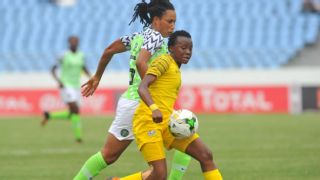|
La Liga's new Managing Director for Africa, Marcos Pelegrin, has only been in the job for a few weeks, but is as up to speed as anyone would like, and clearly a fan of the continent's players in the Spanish top flight. The likes of Samuel Eto'o and Seydou Keita have represented the continent in Spain in recent years, while a new crop of superstars is beginning to emerge, led by the likes of Guinea-Bissau-born Ansu Fati [Barcelona] and Nigeria's Samuel Chukwueze [Villarreal]. As La Liga's top representative in Africa, Pelgrin keeps tabs on the continent's stars, telling ESPN: "We've got, I think, over 40 African players in La Liga. Right now the one that is on everyone's mouth is Ansu Fati, who has made a huge impact within the past month. "But also we have a lot of [other names]. I love [Karl] Toko Ekambi [Cameroonian on the books of Villarreal], he's performing really well, I think he's scored for the past few matches in a row. "Iddrisu Baba with Mallorca, they are doing really well, Ramon Azeez in Granada which is top of the table. And the good thing is many of the [African players] are performing really well and also they belong to top clubs, so I'm very happy about that." La Liga has become a hotbed for African talent, even if some, like Barcelona's teen sensation Fati, seem destined to play for the European nation rather than the country of their birth or parentage.  Pelegrin has succeeded Antonio Barradas, who held the position from 2015 when La Liga opened their offices in Johannesburg, South Africa. He also oversees the Namibia, Botswana, Zambia, Lesotho, Seychelles, Mauritius, Zimbabwe and Eswatini markets. The Spanish league has been incredibly forward-thinking and generous in its outreach programmes, notably partnering with the South African Football Association [SAFA] in initiatives such as #Passtheball, which is a charity drive aimed at uplifting disadvantaged youth through football development, equipment donation, and coaching clinics by La Liga trainers. "Our partnership with SAFA has been very fruitful for both sides in the past three years," Pelegrin said. "Of course when you go to a country, the local federation is the best partner you can get. We were luck to have SAFA on our side and they wanted to partner with us too. "We want to try and put as much content into our agreement as possible and to try to create new projects and try to develop new ideas." La Liga has also developed relationships with the Botswana Premier League [BPL], enjoyed a presence at a recent symposium with the Zimbabwean Premier Soccer League [ZPSL], and is working closely with COSAFA [Council of Southern African Football Associations] to help develop new projects in smaller countries like Mauritius and Malawi. "We want to grow our fan base in the region and COSAFA wants to gain more organisation and to try to throw more relevant tournaments around the region," noted Pelegrin. "Working along with them, we get the presence that we look for, and also COSAFA can work with us in order to [establish] tournaments, which are more like leaving a legacy in those regions instead of an economic objective." La Liga has also been a major driving force behind the development of women's football on the continent, notably helping SAFA in the creation of a professional women's league in South Africa, which was launched earlier in the year. "La Liga supports very strongly women's football," explained Pelegrin. "Three years ago we committed with the Spanish women's football league, but our commitment is also international and global. "In this case we are working along with SAFA in order to try to foster the South African national women's league. But also we partner with Thembi Kgatlana [a forward for the SA national women's team, and current African player of the year] to help her to set up a tournament, which will take place next December."  The Spanish clubs have also become very active on the African continent in regards to passing on their football know-how. In Nigeria, for example, both Real Madrid and Barcelona have opened academies, while La Liga has one in Egypt and is looking at creating another in East Africa. According to Pelegrin, the objective behind these projects "is not only about coaching the kids, it's also about values and education and what La Liga represents, which is much more than the game itself". As for the chance of La Liga teams playing in Africa more often, Pelegrin says he would love to have more Spanish clubs visit the continent but acknowledges that it's not an easy goal to attain, given the demand for the teams across the world. He added: "We are all about bringing La Liga closer to South Africa, so in this regard it is the first demand that we will be getting from the country. "This office is working really hard in order to bring more Spanish teams to South Africa, but as you can understand it is not easy. We've got only 42 clubs who belong to La Liga [including the second-tier La Liga2] and there are 194 countries in the UN."
|

